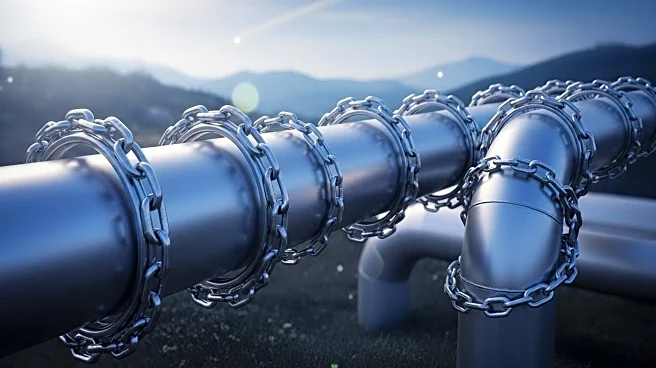What is the story about?
What's Happening?
European Commission President Ursula von der Leyen has proposed new sanctions targeting Russia's liquefied natural gas (LNG) exports, its fleet of aging oil tankers, and major energy companies. This move is part of the EU's ongoing efforts to pressure Russia over its war on Ukraine. Von der Leyen emphasized the need to 'turn off the tap' on LNG and urged EU member states to quickly endorse these sanctions. The proposal includes targeting 118 additional vessels from Russia's shadow fleet, bringing the total to over 560. Major energy companies like Rosneft and Gazprom Neft are set to face full transaction bans and asset freezes if the measures are approved.
Why It's Important?
The proposed sanctions are significant as they aim to cut off a crucial revenue stream for Russia, which relies heavily on energy exports to fund its military operations. By targeting LNG exports and major energy companies, the EU seeks to weaken Russia's economic foundation and force it to reconsider its military actions in Ukraine. The sanctions could also impact global energy markets, potentially leading to shifts in supply chains and pricing. Additionally, the inclusion of third countries, such as China, in the sanctions framework highlights the EU's broader strategy to isolate Russia economically.
What's Next?
The proposed sanctions require approval from all 27 EU member states before they can be implemented. This process can take weeks, as member states negotiate the specifics of the sanctions package. If approved, the sanctions could lead to increased diplomatic tensions between the EU and Russia, as well as potential retaliatory measures from Russia. The EU will likely continue to monitor the impact of these sanctions on Russia's economy and military capabilities, adjusting its strategy as needed.
Beyond the Headlines
The sanctions proposal reflects the EU's commitment to using economic measures as a tool for geopolitical influence. It also underscores the challenges of maintaining unity among member states with varying economic dependencies on Russian energy. The focus on energy companies and third countries highlights the complexity of global energy politics and the interconnectedness of international trade.















